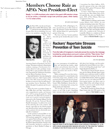Federal funds cannot be used for universal, mandatory, or involuntary mental health screening of children under 18 without their parents' consent if a new bill in Congress is enacted.
Rep. Ron Paul (R-Tex.) re-introduced the Parental Consent Act (HR 181) in the House of Representatives in January. He had introduced an identical bill last year that dozens of his colleagues condemned and then defeated (Psychiatric News, October 15, 2004).
“The bill protects the fundamental right of parents to direct and control the upbringing and education of their children,” Paul told his colleagues, according to the January 4 Congressional Record.
Paul argued that the bill is necessary and presented several questionable findings as factual statements to Congress—among them, that the President's New Freedom Commission on Mental Health had proposed in its landmark report that all children undergo mandatory, universal, non-consensual mental health screening, according to the Congressional Record.
To set the record straight, APA and the American Academy of Child and Adolescent Psychiatry (AACAP) sent a letter about the bill to members of the House and Senate last month and called on them to oppose the legislation, according to Nicholas Meyers, director of the APA Department of Government Relations,
APA and AACAP stated that the findings included in the legislation make false allegations about mental health screening, diagnosis, and treatment.
“The bill is based on a false premise,” Meyers told Psychiatric News. “The New Freedom Commission never proposed universal and mandatory screening for children without parental consent.”
What the commission had stated on the subject in its final report was,“ Quality screening and early intervention should occur in readily accessible, low-stigma settings, such as primary health care facilities and schools, and in settings where a high level of risk for mental health problems exists, such as juvenile justice and child welfare.”
The commission also addressed parental consent by stating, “Whenever `child' or `children' is used in the final report, it is understood that parents or guardians should be included in the process of making choices and decisions for minor children.”
Paul's legislation also states that psychiatrists make diagnoses subjectively. “Therefore,” the bill reads, “it is all too easy for a psychiatrist to label a person's disagreement with the psychiatrist's political beliefs as a mental disorder.”
In responding to this argument in the letter to Congress, APA and AACAP pointed out that “a patient's political beliefs are not included as a basis for psychiatric diagnostic criteria or in commonly accepted treatment guidelines for mental disorders.”
The two associations emphasized that the letter addresses only a few of the false allegations in the legislation.
“Taken together, there is ample evidence to oppose the bill, which is neither accurate nor needed,” the two associations wrote. “On behalf of our members and particularly our patients, including children and adolescents that we treat, we respectfully urge you to reject this unnecessary legislation.”
The bill had 21 cosponsors in late February and was before subcommittees of the House committees on Ways and Means, Energy and Commerce, and Education and the Workforce.
An APA Advocacy Action Alert on the bill is posted online at<http://capwiz.com/psych/mail/oneclick—compose/?alertid=6952921>. The alert provides links to the text of HR 181, the APA/AACAP letter to Congress, and Paul's introductory remarks to the House. The final report of the New Freedom Commission on Mental Health is posted online at<www.mentalhealthcommission.gov>.▪
